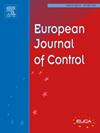具有未知调度信号的LPV系统的数据驱动最小-最大MPC
IF 2.6
3区 计算机科学
Q2 AUTOMATION & CONTROL SYSTEMS
引用次数: 0
摘要
针对线性变参数系统,提出了一种数据驱动的最小-最大模型预测控制方案。目标是在保证闭环系统满足输入和状态约束的同时,将系统引导到原点。与现有的数据驱动LPV控制方法相反,我们假设在离线数据采集和在线系统运行期间调度信号是未知的。假设调度信号的二次矩阵不等式(QMI)描述,我们开发了一种新的数据驱动的一致性系统矩阵表征,仅使用输入状态数据。提出的数据驱动的最小最大MPC在一致的系统矩阵集和所有满足QMI的调度信号上最小化了最坏情况代价的可处理上界。该方法保证了递归可行性、闭环指数稳定性和初始可行时约束的满足性。通过仿真验证了该方法的有效性。本文章由计算机程序翻译,如有差异,请以英文原文为准。
Data-driven min–max MPC for LPV systems with unknown scheduling signal
This paper presents a data-driven min–max model predictive control (MPC) scheme for linear parameter-varying (LPV) systems. The goal is to steer the system to the origin while ensuring that the closed-loop system satisfies input and state constraints. Contrary to existing data-driven LPV control approaches, we assume that the scheduling signal is unknown during offline data collection and online system operation. Assuming a quadratic matrix inequality (QMI) description for the scheduling signal, we develop a novel data-driven characterization of the consistent system matrices using only input-state data. The proposed data-driven min–max MPC minimizes a tractable upper bound on the worst-case cost over the consistent system matrices set and all scheduling signals satisfying the QMI. The proposed approach guarantees recursive feasibility, closed-loop exponential stability and constraint satisfaction if it is feasible at the initial time. We demonstrate the effectiveness of the proposed method in simulation.
求助全文
通过发布文献求助,成功后即可免费获取论文全文。
去求助
来源期刊

European Journal of Control
工程技术-自动化与控制系统
CiteScore
5.80
自引率
5.90%
发文量
131
审稿时长
1 months
期刊介绍:
The European Control Association (EUCA) has among its objectives to promote the development of the discipline. Apart from the European Control Conferences, the European Journal of Control is the Association''s main channel for the dissemination of important contributions in the field.
The aim of the Journal is to publish high quality papers on the theory and practice of control and systems engineering.
The scope of the Journal will be wide and cover all aspects of the discipline including methodologies, techniques and applications.
Research in control and systems engineering is necessary to develop new concepts and tools which enhance our understanding and improve our ability to design and implement high performance control systems. Submitted papers should stress the practical motivations and relevance of their results.
The design and implementation of a successful control system requires the use of a range of techniques:
Modelling
Robustness Analysis
Identification
Optimization
Control Law Design
Numerical analysis
Fault Detection, and so on.
 求助内容:
求助内容: 应助结果提醒方式:
应助结果提醒方式:


